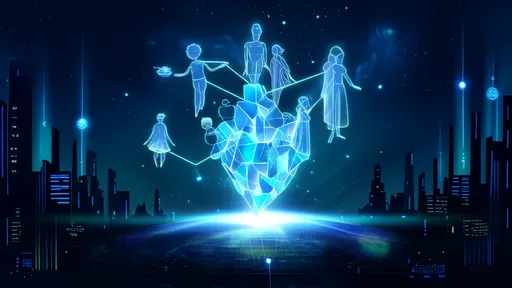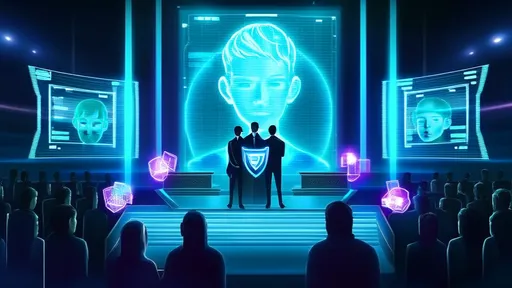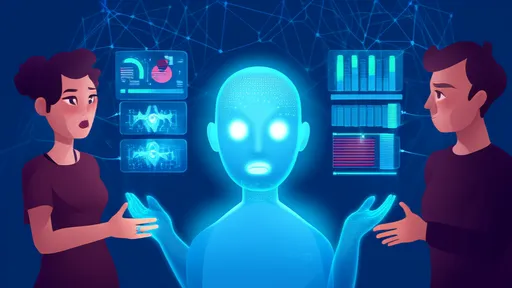The concept of love has always been a subject of fascination, but in the age of the metaverse, it has taken on an entirely new dimension. A recent study published in Frontiers in Psychology explores what researchers are calling "Quantum Entanglement Love"—a phenomenon where couples in virtual relationships develop an intense, almost inseparable bond that mirrors the principles of quantum physics. Unlike traditional relationships, these connections thrive in digital spaces, where physical presence is irrelevant, yet emotional and psychological ties grow stronger than ever.
In the metaverse, couples create avatars, share virtual experiences, and communicate through immersive technologies. The study suggests that this environment fosters a unique kind of intimacy, one where partners feel deeply synchronized, as if their emotions and thoughts are entangled across digital realms. The term "quantum entanglement" is borrowed from physics, where particles remain connected regardless of distance. Similarly, metaverse couples report feeling an inexplicable closeness, even when logged off or geographically apart.
Researchers observed that these relationships often develop at an accelerated pace. Without the limitations of physical proximity, couples in the metaverse engage in constant interaction, leading to rapid emotional bonding. Some participants described their connection as "instant and unbreakable," while others admitted to feeling a sense of dependency that bordered on obsession. The study highlights cases where individuals prioritized their virtual relationships over real-world interactions, raising questions about the psychological implications of such intense digital bonds.
One of the most striking findings was the emergence of a new form of separation anxiety. Unlike traditional long-distance relationships, where physical absence is the primary stressor, metaverse couples experience distress when disconnected from their shared virtual space. The study refers to this as "digital withdrawal," a condition where individuals feel incomplete or anxious when unable to access their virtual partner. Some participants reported symptoms akin to withdrawal from substance addiction, including mood swings, irritability, and compulsive checking of notifications.
The parallels between quantum entanglement and these virtual relationships extend beyond mere metaphor. Just as entangled particles influence each other instantaneously, metaverse couples often describe an uncanny ability to sense their partner's emotional state, even without direct communication. This phenomenon, termed "emotional resonance," suggests that the brain may adapt to virtual intimacy in ways previously unobserved in offline relationships. Neuroscientists involved in the study speculate that repeated exposure to immersive digital interactions could rewire neural pathways, reinforcing emotional dependence.
However, the study also raises ethical concerns. While the metaverse offers unprecedented opportunities for connection, it also blurs the line between healthy attachment and unhealthy fixation. Some psychologists warn that "quantum entanglement love" could lead to emotional burnout or even identity dissolution, where individuals struggle to distinguish their virtual personas from their real-world selves. The lack of physical cues in digital interactions may also amplify misunderstandings, as partners rely solely on curated avatars and text-based communication.
Despite these challenges, many participants in the study expressed a profound sense of fulfillment in their virtual relationships. For some, the metaverse provided a safe space to explore intimacy without the pressures of physical appearance or societal judgment. Others found solace in the ability to connect with like-minded individuals across the globe, transcending cultural and linguistic barriers. The study concludes that while "quantum entanglement love" presents new psychological dilemmas, it also redefines the very nature of human connection in an increasingly digital world.
As the metaverse continues to evolve, so too will the dynamics of virtual relationships. The study calls for further research into the long-term effects of these bonds, particularly as augmented and virtual reality technologies become more sophisticated. For now, one thing is clear: love in the digital age is no longer confined to the physical realm, and its psychological implications are only beginning to unfold.

By /Jul 28, 2025

By /Jul 28, 2025

By /Jul 28, 2025

By /Jul 28, 2025

By /Jul 28, 2025

By /Jul 28, 2025

By /Jul 28, 2025

By /Jul 28, 2025

By /Jul 28, 2025

By /Jul 28, 2025

By /Jul 28, 2025

By /Jul 28, 2025

By /Jul 28, 2025

By /Jul 28, 2025

By /Jul 28, 2025

By /Jul 28, 2025

By /Jul 28, 2025

By /Jul 28, 2025

By /Jul 28, 2025

By /Jul 28, 2025